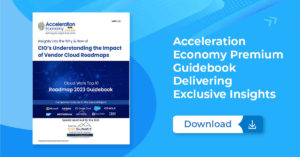
In a time of rapid digital transformation, cloud adoption has become a necessary competitive advantage for enterprises. The vendor-agnostic expertise of value-added resellers (VARs), managed service providers (MSPs), and agents can help organizations drive cloud adoption more effectively than direct sales teams, including those from hyperscalers including Amazon Web Services, Google Cloud, and Microsoft.
These partner sellers, through their depth of knowledge, exposure to diverse products and services, and deeper client engagement, are playing a pivotal role in shaping enterprises’ digital future.
Gain insight into the way Bob Evans builds and updates the Cloud Wars Top 10 ranking, as well as how C-suite executives use the list to inform strategic cloud purchase decisions. That’s available exclusively through the Acceleration Economy Cloud Wars Top 10 Course.
Following are three reasons many enterprises prefer to work with VARs, MSPs, and agents, rather than direct sales teams, when they are selecting and deploying cloud services.
Vendor Agnosticism
One significant advantage of partner sellers is their vendor-agnostic perspective. Rather than promoting a single provider’s services, VARs, MSPs, and agents can analyze the distinct needs of each enterprise and recommend the best cloud solution.
For example, a business might benefit from Google Cloud’s machine learning (ML) capabilities but also need the extensive global network of AWS’ datacenter locations. A partner seller, unlike a direct salesperson, can facilitate a multi-cloud strategy that meets all these requirements for their client.
For example, TPx, a leading MSP that offers customized, multi-cloud solutions, helped a global banking institution transform its IT infrastructure and move to the cloud. The MSP’s deep expertise and agnostic approach facilitated using multiple cloud services: AWS for compute, Google Cloud for artificial intelligence and ML, and Azure for integrated Windows applications. The partnership led to a seamless transition, optimal performance, and robust security.
Trust Through Expertise
Partner sellers often have specialized knowledge and industry-specific expertise, making them indispensable resources for enterprises. As cloud technology evolves and becomes increasingly complex, organizations look for trusted advisors that understand their unique needs and can guide them through their digital transformation journey. They also look to their partners, where they may have 20+ year relationships, instead of direct sales teams, which often have high turnover and shorter-term relationships.
Take the case of CDW, a prominent VAR that helped an expansive healthcare network adopt a cloud-based solution. CDW’s industry-specific knowledge of the healthcare sector, regulations, and inherent challenges, coupled with its understanding of the cloud environment, enabled it to devise a hybrid cloud strategy that improved the client’s operational efficiency while ensuring compliance and security. Had the healthcare network relied on a hyperscaler’s direct sales team, this nuanced understanding and contextual application of technology might not have been possible.
Customer Engagement
Customer engagement is another area where partner sellers often outshine direct sales teams. VARs, MSPs, and agents usually foster deeper relationships with their customers because they’re not just sellers but also service providers and consultants. This ongoing engagement gives partner sellers a more profound understanding of their clients’ business needs, processes, and strategic objectives, allowing them to provide better service.
In contrast, hyperscalers’ direct sales teams are primarily focused on selling their specific cloud services. They may not always have the bandwidth to develop a deep understanding of a client’s unique needs, particularly with small and midsize businesses (SMBs), where they might not allocate significant resources.
This is an important point: In many ways, hyperscalers have looked to empower the channel to serve smaller firms. This is due to the myriad issues they have trying to address smaller firms’ locations, product suitability, and support needs, to name three challenges. To say they left this market to the channel would be an understatement.
But lately, many hyperscalers have voiced their belief that SMB is a hot cloud growth area and are investing time, resources, and focus on these potential customers. In many instances, they are doing this without fully considering the voice of the channel which, for all intents and purposes, owns this customer segment.
While cloud marketplaces may help with transactions from a procurement perspective, they can’t address the need for these smaller firms to have IT and telco support that is predominantly provided by a channel partner. Tackle CEO John Jahnke reports that more than 20% of marketplace orders are placed by a channel partner on behalf of a customer. That number is set to rise as more and more partners are willing to let a hyperscaler take the client’s marketplace order while they earn the services revenue.
This model increases the customer’s loyalty to the partner, something that the hyperscalers should consider carefully in their go-to-market plans and customers should consider in their buying plans. Marketplaces may replace the seller’s quote-to-cash process and streamline the customer’s procurement functions, but they can’t replace the advice, support, and counsel that partners often provide.
Embrace the Cloud Partners Ecosystem
The nuanced understanding, vendor-agnostic advice, and deeper engagement of partner sellers like VARs, MSPs, and agents are proving invaluable as businesses embrace the cloud. The expert and customer-centric approach of partners creates a tailor-made path for enterprises to adopt the cloud and often outperforms the hyperscalers’ direct-sales approach. This highlights the importance of embracing a partners ecosystem to successfully navigate the cloud journey for end-user customers and for the cloud providers.










